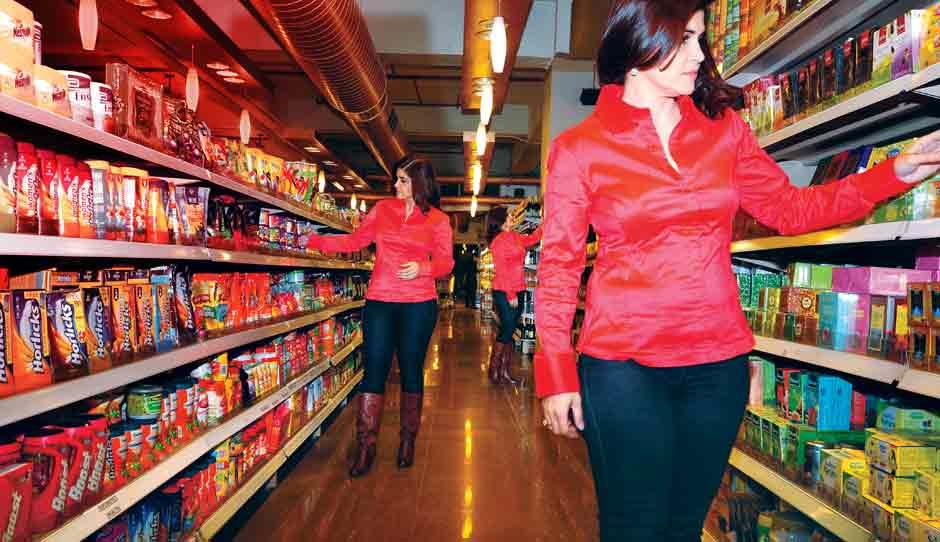The Gourmet Diva: How Mini Yadav Built Le Marche
- BY Nikita Saxena
 In
In  30524
30524 0
0

I was amazed at name she had built."
That’s Nakul Yadav, the 22-year-old son of Mini Yadav, founder and owner of Le Marche retail stores in Delhi. We’re sitting in her office in Vasant Vihar, home to Delhi’s swish set and the starting point of the Le Marche journey. Having been away from the Capital—first at a boarding school in south India and later at a college in UK—Nakul was rather taken aback by how far his mom’s “complete food store” had come in those years.
He isn’t the only one. Le Marche is a story that’s made people and businesses sit up and take notice. While the public is lapping up the “superior shopping experience” at the stores, those in the food import business are glad to find shelf space to display their wares. And still others in the retail industry are wondering how she gets it right—every time.
Since 2005, Yadav has opened nine stores—all at some of the toniest addresses in Delhi and Gurgaon—and provided employment to nearly 300 people. Her latest offering, a 17, 000 sq ft store in South Point Mall in Gurgaon, is one of the biggest grocery stores in the city. Her company Marche Retail, which owns these stores, is hoping to close the current financial year with revenues in excess of Rs70 crore.
More than financial success, she has been lauded for the experience her stores offer to shoppers. For the last two consecutive years, she’s won the prestigious Golden Spoon Awards for excellence in food retailing. “That’s no small achievement, especially for an independent retail chain,” says Rakesh Banga, director, Banyan Finefoods India.
Banga is right. What Mini’s managed to do with Le Marche is no mean feat—especially since she works in an industry that combines the difficulties of retail trading with the unpredictability of consumer preferences in food.
“Le Marche was the pioneer in Delhi and there is no denying that this has a lot to do with Mini,” says Mohit Khattar, managing director, Nature’s Basket. That’s some praise, coming as it does from competition.
What’s more, “She managed to retain the advantages of being the first mover for quite some time,” adds Banga, who’s been in the food business for two decades and has watched Le Marche grow.
Some might argue that Mini was simply in the right place at the right time. The food and grocery retail market in India has seen its best decade so far, growing from a meagre $2 billion in 2006 to $9 billion in 2011—a compounded growth of 30 per cent. (Source: Technopak Analysis)
This growth is quite clearly reflected in the shelves of grocers such as Food Bazaar and the relatively new Godrej’s Nature’s Basket. One of the youngest players in the industry, Nature’s Basket claims to have grown at a CAGR of 66 per cent in the last three years alone.
Indeed, Mini opened up the doors of Le Marche at the right time. The Indian consumer was earning more, travelling more, and therefore, demanding more than ever before. The move from basic groceries to exotic food stuff was part of that journey.
“The opportunity was undoubtedly there. Consumers were certainly ready for international foods, processed foods and more meats and dairy products,” explains Arvind Singhal, chairman, Technopak. The sale of marinated meats at Le Marche stores certainly corroborates this.
What’s more, she worked hard to get her product mix right—something that has been touted as a major factor in Mini’s success by suppliers and competitors alike. “Her understanding of the psyche of the Indian consumer helped her develop the stores in a way that they catered to people from all walks of life,” adds Amit Lohani, CEO, Max Foods, a leading importer of food products and the Convener of Forum of Indian Food Importers.
“For Le Marche, product selection is more about customer fit than about margins,” says Banga. Even at her newest store, where she needed to fill more shelves than ever before, she has not compromised with quality. After having given her suppliers a chance for the first six months, she’s now in the middle of moving out products that didn’t move off the shelves—margins notwithstanding. Her stores offer everything from basic everyday groceries such as pulses and masalas, to exotic imported groceries from around the world. They’re especially known for their extensive meats section. Moreover, explains Mini, the stores offer a choice between three price points: low, middle and high end, thereby offering something for everyone.

In Mini’s case, however, more than right time, the “right place” has fed her success. Of course, Delhi, and its growing expatriate population pushed the demand for international foods. Plus, her penchant for picking the right location has been her secret sauce. “We’re very finicky about our locations, in terms of the buying power of the people living around our stores. We go where the spending power is,” admits Mini.
It’s no wonder then that Marche Retail has charted an impressive growth path in the past two years: from Rs40 crore in 2009-2010 to more than Rs70 crore in 2011-12.
Born and brought up in Delhi, Mini comes from a service-class background. Her father used to work for Indian Oil, while her mother ran a salon in Green Park, an upper middle-class neighbourhood. She studied commerce at Gargi College and got married even before her final exams.
However, she was clear that she didn’t want to be just a housewife. “I had always dreamt of having a corporate life. Even as a child, I knew I wanted to go to office dressed smartly in business suits,” says the 45-year-old mother of two.
Thankfully, she had married a first-generation entrepreneur, Naresh Kumar, who had started one of the first organised salons in Delhi in the 80s. And he gave Mini a taste of the life she wanted for herself. “He encouraged me to work and gave me the opportunity to do so at the salon. I would interact with customers and look after its day-to-day operations,” says she.
She had no formal training either in running a business or as a stylist. Yet, she learnt the ropes, attended seminars to stay abreast of the trends in the business, and introduced the best practices she came across on her travels abroad.
Within a year though, she had her son and decided to stay home to look after him. Around that time, her husband chanced upon an opportunity to collaborate with The Oberoi Group that ran multiple businesses, such as hotels and in-flight catering services. Naresh decided to sell products made at the Group’s delicatessen plant. “We opened the first Sugar & Spice outlet in 1989 in Basant Lok and that’s where the seeds for Le Marche were sown,” she reminisces.
Mini worked hard to educate the consumers about newer products through promotions and food festivals which firmly established her association with exotic groceries.
The store was a hit with the residents of Delhi. By 1992, the second outlet opened its doors, this time in the very expensive Khan Market. “I was solely in charge of it. I would open the store every morning at 8.45am and shut it every night at 9pm,” recalls Mini. In between, she would pick up her son from his playschool and drop him back home to her in-laws.
That was the beginning of the gruelling 12-hour work days that remain till date. “Now that I look back, life’s been like that forever. Yet, I’ve enjoyed every bit of it,” says she.
Things would have remained the same had it not been for The Oberoi Group’s decision to withdraw the franchisee rights in 1997. The Yadavs took on a new supplier and finally set up their own bakery under the name of Sugar & Spice India.
They had travelled quite a lot by then and were totally fascinated by organised retail abroad. “Marks & Spencer seemed like paradise compared to what was available in India. There was a complete lack of organised retail back here,” she recalls. Markets like Khan Market and Greater Kailash had many food stores but offered a poor shopping experience. “Goods would be covered in dust and things would be dumped one on top of the other,” says Mini.
So, when Modern Bazaar (a popular grocery shop in Vasant Vihar that was run out of a building owned by the Yadav family) burned down, they decided to set up a food store there—and thus the first Le Marche store opened shop in 2005. Though the idea was Naresh’s, the execution was left to Mini—something she was only too willing to go along with as long as she was given a freehand to run the place.
For Mini, it was quite a jump from a 400 sq ft Sugar & Spice to a 6,000 sq ft store. “I really didn’t know what I was getting into. I just knew that I wasn’t going to sell jhadoo (brooms). So we put together the basic groceries of a GK shop along with the exotic groceries available in Khan Market,” says she of her product portfolio.
But it helped that she had spent the past few years running a food shop. People who came to buy bakery products often asked for more. That ear to the consumer’s needs helped Mini decide on what wares will be displayed on the shelves including goods that she “hadn’t even heard of”.
Organised product displays were a change for Delhi shoppers. Softer touches, such as soft flowing music that changed with the time of the day and housekeeping staff who kept the store area spick-and-span, ensured a superior shopping experience, even if the goods were the same as at other places. At some stores, she put up pin boards for customers to write whatever they couldn’t find in her stores. “Whatever our customers wanted, we took it upon ourselves to make it available. This gave them the confidence that they could get what they needed at Le Marche” says Mini.
Moreover, Mini worked hard to educate the consumers about newer products through promotions and food festivals which firmly established her association with exotic groceries. And that laid the foundation of the business Mini built—albeit with help from her family.
Mini has played it quite safe till now. After opening the first store nearly six years ago, she didn’t do much till about two-and-a-half-years ago. “We waited, we learnt from our mistakes, and only then did we expand. We’re not an industrial house and we have no backing. Our own resources go into every store. So we’re very cautious about the waters we tread on,” says Mini.
She almost admits to not being overly ambitious about growth. “We’re quite content with the north—Punjab and Delhi NCR. We’re ambitious in the sense that we want to see our brand everywhere. But we like to go slow and take it easy.”
In fact, Mini declined an offer to set-up shop in one of the high-end malls in Mumbai. “It required one of us to shift base and we didn’t want to do that,” she admits.
So far, she’s run the show with the help of her family members. Her husband helps choose locations and supplies “the infrastructure whenever a new location comes up”. Her father-in-law takes care of the 10,000 sq ft bakery in Gurgaon that supplies products to all the stores. Her father owns the outlet in Khan Market which houses Sugar & Spice, and keeps an eye on things for her.

Even the younger generation has started pitching in. Her son Nakul has been helping her for the past year. He’s brought in TCS to put together strong IT systems at the back end, and streamline accounting and finance. Nearly all of her 450-plus suppliers are now being paid electronically, and Mini’s been relieved from signing “100 cheques a day”. Nakul is, in fact, solely in-charge of the biggest store in the chain. Mini’s nephew, Rahul, looks after the purchasing including decisions on the margins offered to suppliers.
However, that can hardly remain so in future—even given the lack of ambitions of scale. As someone put it, “How many stores can she be personally involved in?”
The consumer wants every Le Marche store to look the same, and offer the same quality of experience and products. That would be difficult to achieve without the help of some solid systems and processes. And though Mini is quite sure that the family’s presence isn’t needed and that “every store works on systems”, she admits that “everyone’s too dependent on me”.
It’s not as if there are any serious problems with the business. Every first-generation entrepreneur goes through a similar cycle—having tasted success, the groundwork is laid for scale. “We’re also putting together a professional management team,” says Mini. However, it might not be easy for her to convince professional talent to join her, given the family’s heavy involvement in the business.
On top of that, her set of internal challenges is playing out in a business landscape that’s changing very quickly. Newer players, such as Spencer’s Gourmet and HyperCITY, have entered the fray. Even chains like Easy Day are upgrading their offering to include gourmet foods. This means that customers and suppliers alike have more options now than before. Even employees have the option to move to more “professional” set ups.
Most of the retail players come from business houses with deeper pockets and management bandwidth. They don’t face the problems of turning a family-run business into a professionally-run one that can scale up fast.
Having said so, India is a growing market and there’s space for many players right now. “The market is currently under penetrated by modern suppliers. If they were to pause and start putting in place proper systems, even now, then each of them—whether Le Marche or Nature’s Basket, has the potential to become a much larger business than what they are today,” adds Technopak’s Singhal.
Mini seems to have realised this and is working towards putting the house in order. “We have to become a system-driven company, and you should see many changes along those lines in the coming year,” says she. There’s an increasing realisation that this will require deeper pockets than theirs, and therefore, efforts are being made to find someone who shares their passion for the business. “We’ve decided to find equity participation from a like-minded partner and infuse funds into the business in the next financial year,” adds Mini.
Nakul’s working with TCS to launch an online version of the stores, which will cater to the growing category of online shoppers who value time over anything else. They’re even thinking rather ambitiously for a change—“We hope to ramp up by another four to five outlets and increase the turnover to Rs200 crore by the end of 2012-13”. As if on cue, all the three Yadavs unanimously declare this isn’t a hard target to achieve given their current standing in the market. That confidence is just what they need to realise Mini’s ultimate dream—“to build a Harrods Food Hall in India and to maintain those standards”.





























Add new comment